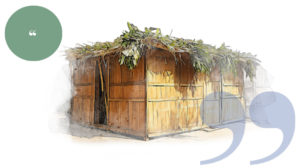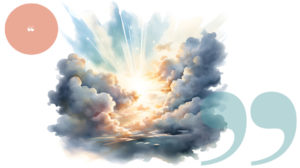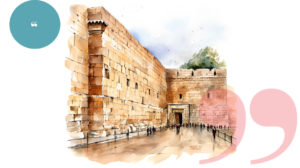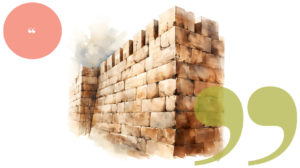Personal Pesach

We’ve survived before and we’ll survive again

“And they will enslave them and oppress them, for four hundred years...” (Hagaddah shel Pesach)
Imagine the mindset of the Jews in exile in Mitzrayim. They knew that Avraham had received a prophecy that the Egyptian exile would last over 400 years. How could they survive that long? Any hope of escape was blocked due to the Egyptians’ magic. When the people complained to Moshe, Hashem told Moshe to answer that just as He was with their forefathers, so He’d be with them — this pain was only temporary.
How is that enough of a comfort to help them survive for over 400 years? (Rav Itamar Schwartz, Bilvavi)
I invited my good friend Penina to visit the first day of Chol Hamoed. She lived far away, and we didn’t see each other often enough. We planned a park date for our kids and I was looking forward to seeing her.
But when she walked into my house, I was shocked at her appearance. Her eyes were shadowed, and although she was smiling, she looked like she’d been plowed over by a truck.
I waited until we were in the park to try to find out what happened.
Hashem’s words teach us how to deal with our own difficulties. When a person has a problem, he usually convinces himself that it’s the worst problem he ever had. He compares his new problem to his previous problems, but because they’re not exactly the same, he doesn’t know the solution. He panics. Eventually, the problem goes away, and he forgets about it. Then a new problem arises and the cycle repeats itself… The person fails to remember that despite each problem being the “worst ever,” he survived. It’s only because he panics that he can’t cope.
When going through a difficult time, we must remember that a solution exists, even if we can’t see it. We’ve survived before and we’ll survive again.
“So, how was your Seder? Looks like it was a late night.”
Penina shrugged uncomfortably, but I held her gaze. “It was nice.” She shifted on the hard bench. “But then Shimmy had a meltdown.”
Penina’s a pretty private person, but there’s no hiding her son with special needs. Suddenly her words came pouring out, laced with pain.
“Pesach’s always hard for Shimmy — it disrupts his daily structure. Seder night’s the most difficult because his meds wear off, but he desperately wanted to stay up. I so badly wanted it to work for his sake. Yet about halfway through, I saw he wasn’t managing. I gently told him it was time for bed and that maybe next year he’ll be able to stay up for the whole Seder. And then...” She paused, reaching for a tissue. “Well, he basically went berserk. He started running around the dining room, screaming, hitting, throwing things. Finally my husband restrained him and got him into his room. I sat back down at the table and then…” I reached for her hand. “Then I lost it. I started crying hysterically. I’d tried so hard — all I wanted was for everyone to be happy. I sat there bawling, unable to stop, and hating myself for ruining the Seder.”
The Ramban tells us that the actions of our forefathers are signs for their children. Just like Hashem took the Jews out from Mitzrayim, so too He’ll help each one of us out of our problems, even if it seems like there are no natural solutions.
Every day in our tefillos we mention Yetzias Mitzrayim. Why? Because it serves as the foundation that enables us to survive all our troubles. Just like Hashem was with us then, so He’s with us now. Just like there was a public redemption, so there’s a private redemption for each person’s soul.
I was crying now, too. Penina handed me a tissue. “Somehow,” she continued softly, “I managed to pick up my head and look around the table at the rest of my kids. Several were also crying by then. I reached deep inside myself and found the strength to say to them: ‘Everyone in this world has a Mitzrayim, and Hashem always leads him out of it.’ Then we started hugging each other, still crying, but it became a powerful, moving moment instead of a rock-bottom ruined Seder.”
I sat there on the hard park bench holding her hand and marveling at the strength Hashem gave her to pull through. Penina wasn’t surviving. She was thriving.
(Originally featured in Family First, Issue 586)
Oops! We could not locate your form.








